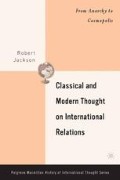Abstract
International thought is an inquiry into the fundamental ideas and beliefs involved in the arrangement and conduct of world affairs over time: international anarchy, the society of states, the cosmopolis of humankind, hegemony, empire, confederation, the practice of diplomacy, international law, war, espionage, world commerce, international organization, global civil society—to mention some of the most prominent. It is also an inquiry into the values at stake: peace, security, independence, order, justice, human rights, prosperity, and progress, among others. Most of these ideas, beliefs, and values occupy center stage in the following chapters. International thought is an inquiry, as well, into the language and discourse of world affairs. Furthermore, any study of international thought calls for attention to leading thinkers, past and present, whose accumulated writings constitute the most important body of knowledge on the subject. The work of several such thinkers is examined over the course of this study.
It is unbelievable how many systems of morals and politics have been successively found, forgotten, rediscovered, forgotten again, to reappear a little later, always charming and surprising the world as if they were new, and bearing witness, not to the fecundity of the human spirit, but to the ignorance of men.
Alexis de Tocqueville
Access this chapter
Tax calculation will be finalised at checkout
Purchases are for personal use only
Preview
Unable to display preview. Download preview PDF.
Notes
See M. Oakeshott, On Human Conduct (Oxford: Clarendon Press, 1975), pp. 112–17.
C. Perry, “The Relation between Ethics and Political Science,” International Journal of Ethics, vol. 47 (January 1937), pp. 163–79.
M. Keen, Medieval Europe (London: Penguin Books, 1991), p. 100.
M. Oakeshott, The Voice of Liberal Learning (Indianapolis, IN: Liberty Fund, 2001), p. 179.
A. Toynbee, The World and the West (New York: Oxford University Press, 1953), pp. 8–10.
H. Reiss (ed.), Kant: Political Writings, 2nd enl. ed. (Cambridge: Cambridge University Press, 1991), p. 18.
Barbara Tuchman, The March of Folly: From Troy to Vietnam (New York: Ballantine Books, 1985).
N. Machiavelli, The Prince tr. and ed. G. Bull (Harmondsworth, UK: Penguin Books, 1961), ch. XXV.
H. Butterfield, “The Tragic Element in Modern International Conflict,” in History and Human Relations (London: Collins, 1951), pp. 9–36.
See Hans J. Morgenthau, Politics among Nations: The Struggle for Power and Peace (New York: Knopf, 1960).
G. Vlastos, Socrates: Ironist and Moral Philosopher (Ithaca: Cornell University Press, 1991), pp. 212–13.
T. Hobbes, Man and Citizen (De Homine and De Cive), ed. B. Gert (Indianapolis, IN: Hacket, 1991), p. 258.
H. Bull, The Anarchical Society 2nd ed. (London: Macmillan, 1995), part III.
H. Grotius, De Jure Belli ac Pacis Libri Tres, tr. Francis Kelsay (Oxford: Oxford University Press, 1925);
H. Reiss (ed.), Kant’s Political Writings 2nd enl. ed. (Cambridge: Cambridge University Press, 1991); and Hobbes, Man and Citizen.
H. Arendt, The Human Condition (Chicago: University of Chicago Press, 1958).
H. Arendt, The Origins of Totalitarianism (New York, Harcourt Brace, 1951).
T. Nardin and D. Mapel (eds.), Traditions of International Ethics (Cambridge: Cambridge University Press, 1992).
See M. Oakeshott, Rationalism in Politics and Other Essays, new and exp. ed. (Indianapolis, IN: Liberty Press, 1991), pp. 19–21.
Quoted by M. Wight, International Theory: The Three Traditions, ed. G. Wight and B. Porter (Leicester: Leicester University Press, 1991), p. 5.
H. Bull, “International Theory: The Case for a Classical Approach,” in K. Knorr and J.N. Rosenau (eds.), Contending Approaches to International Politics (Princeton, NJ: Princeton University Press, 1969).
Copyright information
© 2005 Robert Jackson
About this chapter
Cite this chapter
Jackson, R. (2005). International Thought. In: Classical and Modern Thought on International Relations. Palgrave Macmillan History of International Thought Series. Palgrave Macmillan, New York. https://doi.org/10.1057/9781403979520_1
Download citation
DOI: https://doi.org/10.1057/9781403979520_1
Publisher Name: Palgrave Macmillan, New York
Print ISBN: 978-1-4039-6858-6
Online ISBN: 978-1-4039-7952-0
eBook Packages: Palgrave Political & Intern. Studies CollectionPolitical Science and International Studies (R0)

